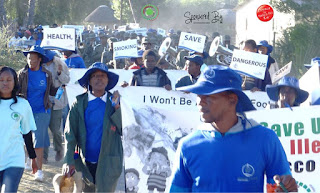9-10 July 2013
Francistown
Cresta Thapama Hotel
 |
| Mr. John Moloi officially opening the workshop |
The Anti Tobacco Network conducted a two day workshop for health workers in Francistown in collaboration with the Ministry of Health, WHO and the District Health Management Team (DHMT) on the 9-10th of July 2013 in Francistown, Cresta Thapama Hotel.
The workshop is a third in a series of workshops that started in Gaborone in late March and later on went to Maun and finally came to Francistown. Introducing the objectives Thabo Katlholo, ATN Administrative Assistant indicated that these workshops were aimed at increasing the level of awareness on tobacco and its impact on health, the economy and the environment. The workshops are also intended to familiarize the media, civil societies and health workers on the provisions of the Framework Convention on Tobacco Control (FCTC) as well as the Botswana Control of Smoking Act plus to sensitize them on the tactics used by the tobacco industry to interfere with government's efforts and initiatives to control tobacco.
 |
| Group Discussions |
The other objective of the workshop was to involve the participating stakeholders in the planning of the
I Dont Want To Be A Walking Billboard For The Tobacco Industry campaign which will be launched in Francistown on the 30th of August, 2013 as agreed by the workshop participants.
Workshop Highlight
 |
Mr. Kgotlaetsile Moube listening in
during discussions |
Usage of tobacco and CULTURE - Kids are given snuff to curb nose-bleeding. Participants emphasized that people burn snuff and use the smoke to "stop" the nose bleeding. Participants further cited the fact that tobacco is also used ("degwe" Ikalanga) to pay lobola in Bukalanga. Tobacco narrows blood vessels and therefore circulation becomes very poor. However, there is treatment that can be done instead of tobacco. Participants went further on to list many other examples of the "myths" that link cultural beliefs and tobacco consumption especially chewing tobacco. Dr. Bontle Mbongwe, Interim Executive Director of the Anti Tobacco Network said these cultural practices cannot be ignored but they have to be approached in such a way that it will not enrage the community. It was suggested that there is a need for a study on cultural practices and tobacco use. Health educators have to establish the cultural beliefs about smoking before they start on campaigns regarding tobacco use.
 |
Health workers - Group
discussions |
Resolution: Health workers were edged to include tobacco consumption issues on their health talks and give ATN some of those stories that link tobacco to cultural beliefs and activities.
1. Pressing Tobacco Control Issues in Ftwn
a) Illegal products - Francistown is closer to the border
b) Law enforcers concentrate in Francistown than in villages near the city
c) Cultural beliefs and tobacco use
2. Activities to address this:
a) Health education - community, school kids, parents, law enforcement officers and retailers.
b) Dissemination IEC material that show the dangers of tobacco use
c) Development of a comprehensive tobacco control bill in Botswana
d) Lobby for funding for research that targets tobacco consumption and cultural beliefs
Group Discussions & Presentations
 Workshop Recommendations
Workshop Recommendations
Formation of Anti Tobacco Committe - To develop and monitor the tobacco control plan. These should be led by the chosen committe which will spearhead these movement. Benchmarking in other towns that have carried out the campaign. The group also recommended school health fairs. The committe should coordinate with school health clubs and various other school clubs to address tobbaco consumption issues.
The workshop participants strongly felt that tobacco issues need to be addressed extensively and opened for the communities to engage in through Talk Shows (Maokaneng, Molemo-Wa-Kgang, Tsa Botsogo etc.). It was also expressed that new approaches are essential in educating our communities. The posters need to be more innovative. These new strategies should evolve with the mindsets of our people. There was also a call for training of Health Professionals on issues of Cessation.

































































